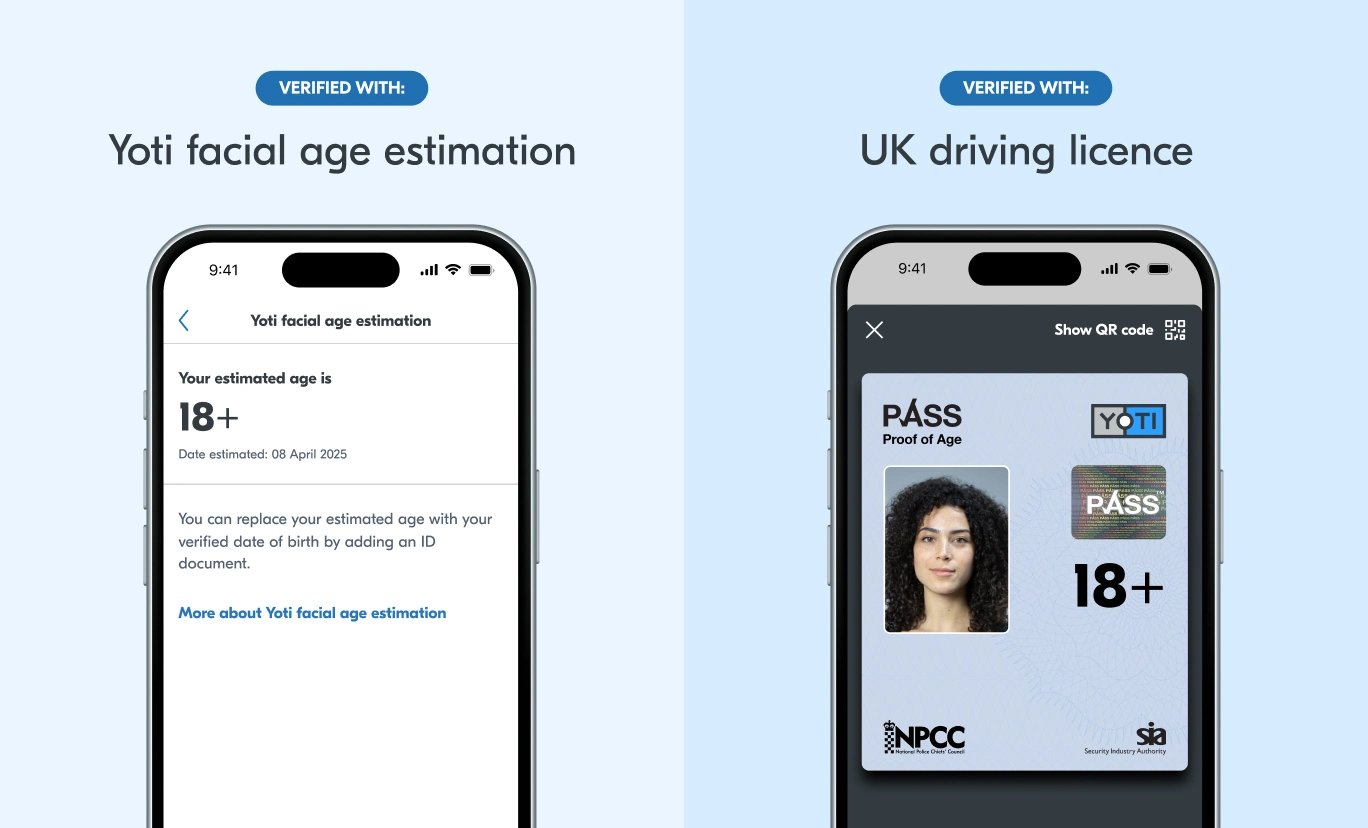
In this blog series, our CEO Robin Tombs will be sharing his experience, whilst focusing on major themes, news and issues in the world of identity verification and age assurance.
This month, Robin gives a summary of the upcoming legislation for online porn in France, responds to Ofcom’s claims that facial age estimation is not effective for under 13s, and looks at the upcoming Digital Information and Smart Data Bill.
French regulator introduces age checks for online adult content
Big news this month that Arcom, the French regulator responsible for online porn, has announced the date that platforms will need to introduce age checks. From 11th January 2025, websites with pornographic content will need to check the age of users, ensuring only adults can access the content.
There will be a three month transitional period, where temporary methods like bank card verification can be used as a preliminary age filter, but they must include strong authentication to ensure that the user is the cardholder. This transitional period will end on 11th April 2025.
It is clear that the French Government, through Arcom, is very serious about enforcing effective, privacy-preserving age checks to prevent children accidentally or intentionally accessing porn.
The Paris Court of Appeal has decided to force Internet Service providers (ISPs) to block access to several pornographic sites which do not verify the age of users. The Court ruled that: “Giving priority to the protection of the private lives of adult consumers, by ruling out age verification, is incompatible with the protection of minors.”
There may be further legal twists and turns over the next few months but it’s increasingly likely that between January and April 2025, sites will have to use privacy-preserving age checks or risk getting blocked by French ISPs. The law applies to any platforms hosting user generated porn, not just dedicated porn sites.
We will be watching closely to see if France becomes the first high profile EU country to successfully introduce age checks for French viewers of online porn. We already have a number of privacy-preserving age solutions that can help sites to meet Arcom’s requirements. Read more here.
Response to Ofcom’s claims that facial age estimation is not effective for under 13s
Followers of Yoti will know currently we respectfully have two big issues with Ofcom.
Firstly, in May 2024, Ofcom published its Guidance on “Protecting children from harms online”. Clause 15.318 on page 102 of the 480 page document explains that “there is currently limited independent evidence on the capability of current age assurance methods to correctly distinguish between child users of different ages to a highly effective standard, without disproportionately affecting children’s rights.”
Yoti recognises that there is limited independent evidence but that’s discounting other highly credible evidence such as:
- Yoti has been publishing facial age estimation white papers, with accuracy by year of age, since December 2018. Nobody has credibly demonstrated that our published performance is misleading.
- OnlyFans has publicly stated Yoti facial age estimation is effective for 18+/- age gating.
- In January 2023, Yubo CEO Sacha Lazimi spoke about Yoti, saying we “estimate with 98.9 per cent accuracy an individual’s age, to enhance the accuracy of age gating on Yubo. Asking people to verify their age when they sign up to the platform helps to ensure that no one under 13 is able to access the platform, and that interactions between age groups, specifically teens and adults, are limited.”
- Back in November 2020, the Age Check Certification Scheme independently certified Yoti to be 98.89% accurate at estimating 18s as under 25. ACCS doesn’t yet have child data to test Yoti’s accuracy for children.
Ofcom are yet to explain what the maths will be for facial age estimation and other methods to meet the ‘highly effective’ age assurance bar. They have also not explained why they think 13+/- age gating needs to be ‘highly effective’ rather than “broadly effective”, if they deem the former bar is currently unattainable.
Without understanding this maths, it’s not possible to weigh up if there’s more harm being caused by not requiring any 13+/- age gating to protect millions of children (mostly 8-12 year olds) online.
Our second issue is that in July 2024, the Ofcom CEO asserted on Radio 4’s Today programme that, “One of the reasons is that these age assurance technologies – which scan your face and estimate your age, and don’t ask for any other details, but do estimate your age, don’t work very well on children, as children can look so different at different ages, as I’m sure we all know.”
We explained to Ofcom that unless they had clear supporting scientific evidence, this unsubstantiated assertion from a leading regulator’s CEO should be amended as it is not Ofcom’s formal view and is currently misleading and damaging to facial age estimation providers. Ofcom did not provide any evidence but sadly still refused to amend the CEO’s message.
Some businesses may now think they don’t need to prepare to mitigate harms or enforce their minimum age T&Cs by 13+/- age checking UK children.
Some platforms, like Yubo, are already checking the age of all users – placing them into different groups based on their age, and stopping under 13s from creating accounts. It’s strong evidence of how facial age estimation is being successfully used to protect children online and give them an experience appropriate for their age.
The UK’s new Data Bill
It was great to see Hannah Rutter, Head of Digital Identity at Department for Science, Innovation and Technology (DSIT) spreading awareness of the early success of the UK Government Digital Identity & Attributes Trust Framework (DIATF) and the potential benefits to come once the Data Bill becomes law.
Over 50 Identity Service Providers (IDSPs) from different countries have been certified under DIATF, and hundreds of thousands of right to work and DBS criminal record checks are already being completed every month. When offered the choice, about 30% of UK citizens already use a DIATF certified and trusted reusable Digital ID – either Yoti, Post Office EasyID or Lloyds Bank Smart ID.
Hannah explains that the new law will:
- give legal standing to the trust framework as a set of rules for a ‘good’ digital verification services across the economy, with supplementary rules where needed.
- allow for services on the register to be issued with a trust mark, making it easy to identify the trustworthy services.
DSIT says they will also play a key role in enabling the market and will continue the work with regulators and other government departments to identify and remove barriers to the use of digital identity services.
Once the Data Bill is enacted, it will be critical that relevant UK regulators quickly recognise the trust framework and that compliance officers understand it is best practice ID verification. Over the last 2.5 years neither the Financial Conduct Authority or Gambling Commission have given any official guidance to compliance officers recognising the quality of certified ID.
British supermarkets and facial age estimation vendors such as Yoti have already been waiting a crazy 2.5 years since the 2022 digital proof of age trials ended. Yoti successfully completed 98,000 age checks (with facial age estimation and Digital ID) across five supermarket groups. There were no reported underage sales.
DSIT must give the Home Office confidence regarding digital proof of age so the Home Office can change the Mandatory Licensing Conditions. This would allow shoppers and businesses to use a certified digital proof of age and effective facial age estimation when buying alcohol in licensed premises.
Since February 2023, DSIT has remained silent about the UK’s lead in facial age estimation for providing effective age checks. This is despite 1) the UK regulator Ofcom making it clear in late 2023 that the technology can be highly effective for adults and 2) big online brands have been using Yoti facial age estimation successfully for several years.
Peter Kyle, Keir Starmer and Jonathan Reynolds MP have all said UK regulation needs to better recognise innovation that can improve regulatory outcomes, reduce costs, spur investment and economic growth.
But these big benefits will only be gained at a very low cost if the new Government acts on its words. Action to unlock the benefits of Digital IDs and facial age estimation will be early litmus tests.
*The final section of this article has been edited to include the new legislation’s updated name.



